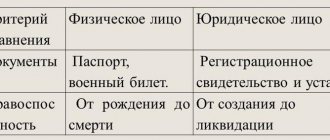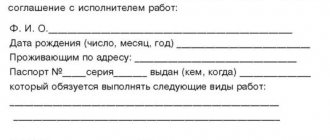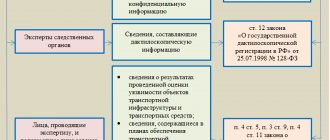The concept of the subject
Subjects of labor law are persons who are subject to the norms of labor legislation, who have a certain set of rights and obligations, and are able to implement and fulfill them through their actions. Each of them has a set of characteristics.
- Legal capacity. It means the ability to have labor rights and bear responsibilities.
- Legal capacity. It presupposes the ability to independently exercise labor rights or fulfill obligations.
- Powerful powers. They do not apply to all participants in labor relations. We are talking about situations where an employer, institution or organization issues instructions that are binding on others.
Labor relations are distinguished by the simultaneous emergence of legal capacity and legal capacity among their subjects.
It is necessary to distinguish between labor and civil relations. The latter are possible in cases where a contract for the provision of services or performance of work is concluded.
Such situations do not imply that the parties have a special status provided for by the Labor Code of the Russian Federation.
Rights and obligations of subjects of labor relations
As mentioned above, labor relations arise between entities at the moment when the hired employee begins to perform official duties.
Formally, the manager must officially employ the citizen within three days - sign an appropriate agreement with him and issue a work book.
In Russia, only the written form of an agreement is recognized as legal. Refusal to formalize it is unlawful, so the violator will be held accountable.
All subjects of labor relations have corresponding rights, guarantees and obligations. Their exact list depends on the status of the person and whether he has Russian citizenship.
As a rule, a foreigner acting both as an employer and an employee has a number of restrictions (for example, he is not able to occupy the position of a civil servant).
Responsibilities, guarantees and rights of the employee
The main powers and labor responsibilities of an employee are fixed in Article 21 of the Labor Code of the Russian Federation.
Thus, an employee hired for a position undertakes to comply with the norms of labor legislation and the internal regulations of the company, conscientiously perform the official functions assigned to him, preserve the employer’s property, maintain order in his workplace and promptly inform the manager about the process of his activities, as well as the occurrence of situations that could harm the life and health of other personnel.
Employee rights include:
- conclusion, amendment or termination of an employment contract;
- timely receipt of remuneration due to him for his work;
- undergoing professional training (including for the purpose of advanced training);
- work under the conditions specified in the contract concluded with the manager;
- receiving rest, calculated taking into account the length of the citizen’s work;
- obtaining reliable information about the official location and working conditions;
- the opportunity to join professional associations, the purpose of which is to protect the rights and interests of employees;
- receiving compensation for damage caused to him (material and/or moral);
- the opportunity to organize strikes and defend their rights in other legal ways;
- obtaining compulsory social insurance, if provided by law in a specific situation.
Violation of employee rights is unacceptable. In this case, a citizen can apply to the state labor inspectorate (aka GIS), the prosecutor's office and the court to protect his interests.
Unfair performance of labor duties by an employee is also a basis for management to terminate a previously concluded contract.
Responsibilities, guarantees and rights of the manager
Seizure of property by bailiffs - . How to become an arbitration manager -.
The concept of accounts receivable and accounts payable - .
The powers and responsibilities of management, as set forth in Article 22 of the Labor Code of the Russian Federation, are determined by the employment contract and additional agreements concluded with hired employees.
Thus, this entity can enter into and terminate contracts, make changes to them that do not contradict the law, reward personnel for effective work, and hold employees accountable for their dishonest performance of official functions.
Management responsibilities include:
- compliance with labor legislation, internal regulations of the enterprise and the terms of the contract concluded with the employee;
- ensuring favorable and safe working conditions;
- timely payment of salaries and other remuneration due to employees in connection with the performance of official functions;
- notifying staff about changes made to local regulations.
Acting as a subject of social and labor relations, the employer can conduct collective negotiations and conclude appropriate collective agreements.
Management also has the right to create their own associations aimed at protecting their interests and issue local regulations that control the company’s activities.
Management may require personnel to perform job duties stipulated by the contract.
Types of participants in labor relations
Participants in labor relations are often limited to the parties of the employee and the employer. The list of such subjects is much wider than the circle of persons established in Art. 20 Labor Code of the Russian Federation. The parties to the contract are only the most common participants in the employment relationship. They can be called the main subjects. Along with them, there are many additional participants:
- authorities monitoring compliance with labor laws;
- trade union organizations;
- labor dispute commissions;
- structures operating within the framework of social partnership in the labor sphere.
The activities of the listed entities are derivative in nature and are associated with separate procedures provided for by law. For this reason, they can be classified as an additional category.
The employee as a participant in labor relations
According to Art. 20 of the Labor Code of the Russian Federation, only individuals can be employees. At the time of concluding an employment contract, the applicant must be at least 16 years old. There are several exceptions to this rule established by Art. 63 Labor Code of the Russian Federation:
- A contract can be concluded by a 15-year-old teenager if the work falls into the category of light work that is not associated with harm to health.
- With the consent of the legal representative or the guardianship and trusteeship authority, an agreement can be concluded with a 14-year-old employee. At the same time, he can carry out safe and easy work only in his free time from school.
- In some cases, it is possible to attract workers under 14 years of age. We are talking about various creative teams. The agreement is signed with the legal representative or guardian on the basis of a permit issued by the guardianship and trusteeship authority.
At the moment of signing the contract, an individual acquires the status of an employee, provided for in Art. 21 Labor Code of the Russian Federation.
IMPORTANT! Disputes can arise when a company sends its employees to work for another organization. Such cases are called personnel leasing and are regulated by Chapter 53.1 of the Labor Code of the Russian Federation.
A legal entity providing labor resources cannot be considered an employee, since direct labor functions are performed by citizens.
Article TCRF 20. Parties to labor relations
Commentary on Article 20
1. According to Art. 20 of the Labor Code the parties to the labor relationship are the employee and the employer.
2. An employee is an individual who has entered into an employment contract with the employer and, on this basis, has entered into an employment relationship with him.
To carry out the act of entering into labor relations and acquiring the status of an employee, each individual must have labor legal personality, all the parameters of which are not disclosed by labor legislation. At the same time, the personal nature of labor relations (see Article 15 of the Labor Code and the commentary to it) definitely requires that the person concluding an employment contract has at least the actual and legal ability to independently carry out the work that constitutes the content of his labor function, determined by employment contract. At the same time, actual ability to work should be understood as the presence of physical, intellectual and volitional qualities in a potential employee, which together form his general and special ability to work. The absence of such actual ability to work may be evidenced by the employee’s disability, as well as his young age. In turn, legal ability to work is understood as the possession by an individual of a number of formal characteristics provided for by law, which grant him the right to perform this type of labor activity. Signs of this kind include: a) the age of an individual; b) he has special education or special training; c) possession, if necessary, of Russian Federation citizenship and access to this work; d) the absence of medical contraindications to the work performed or court prohibitions on engaging in relevant activities, etc.
Labor legislation addresses detailed regulation of only one element of labor legal personality - the minimum age of the employee. As a general rule, entry into employment relationships is allowed with persons over 16 years of age. In cases provided for by law, it is permitted to employ persons over 15 years of age or students over 14 years of age, as well as concluding an employment contract with minors under 14 years of age to participate in the creation and performance of works in cinematography organizations and circuses. , theater and concert organizations (see Article 63 of the Labor Code and commentary thereto).
At the same time, the legislation does not contain a general ban on persons who have reached a certain age limit entering into labor relations. There are only certain exceptions to this rule, concerning, for example, civil servants, who have an age limit of 65 years for being in the state civil service (Article 21 of the Federal Law of July 27, 2004 N 79-FZ “On the State Civil Service of the Russian Federation”) Federation"). In addition, the rector of a university or the dean of a faculty can be a person, as a general rule, no older than 65 years (Federal Law of August 22, 1996 N 125-FZ “On Higher and Postgraduate Professional Education”).
3. Both individuals and legal entities can act as employers.
An individual can act as an employer in three cases when he: carries out entrepreneurial activities without forming a legal entity; uses the labor of another individual for the purpose of performing certain public functions performed on the basis of state registration and (or) licensing (for example, as a private notary, lawyer); uses the labor of another individual in his consumer economy for the purpose of personal service and assistance in housekeeping as, for example, domestic workers such as a nanny, housewife, housekeeper, tutor (or governess), secretary, etc.
The full labor legal personality of employers - individuals is associated with:
A) for individual entrepreneurs - with an act of state registration of the person as an individual entrepreneur;
B) for persons performing certain public functions - with obtaining the official status of a private notary or lawyer;
C) for persons who use the labor of other persons in their personal consumer household - upon reaching the age of 18 years and (or) having full civil capacity, allowing each individual not only to perform legally significant actions, but also to bear responsibility for the execution (failure to perform) responsibilities arising from them.
Individuals who have reached the age of 18 and have independent income, but whose legal capacity is limited by the court, have the right to enter into employment contracts with employees for the purpose of personal service or assistance with housekeeping only with the written consent of the trustees.
Individuals who have reached the age of 18 and have independent income, but have been declared incompetent by a court, do not have the right to independently enter into employment contracts with employees for the purpose of personal service or assistance with housekeeping. Such contracts are concluded for them by their guardians.
Minors aged 14 to 18 years have the right to enter into employment contracts with employees for personal services and assistance in housekeeping under two conditions: a) they have their own earnings, scholarships or other income; b) the consent of their legal representatives (parents, guardians, trustees). These same legal representatives bear additional legal responsibility for obligations arising from the employment relationship of minor employers, including obligations to pay wages.
4. For many Russian workers, organizations that have the status of a legal entity act as employers.
Labor legislation does not disclose the characteristics of a legal entity, since they are mainly subjects of civil law. According to Art. 48 of the Civil Code, a legal entity is recognized as an organization that has separate property in ownership, economic management or operational management and is liable for its obligations with this property, can acquire and exercise property and personal rights in its own name, bear responsibilities, and be a plaintiff and defendant in court.
The labor legal personality of a legal entity arises from the moment of its state registration, carried out in the manner prescribed by law (Federal Law of August 8, 2001 N 129-FZ “On State Registration of Legal Entities”). The labor legal personality of an organization—a legal entity—is general in the sense that its scope does not depend on the goals and objectives for which the organization was created. The scope of rights, duties and responsibilities is equal in scope for all employers - legal entities. At the same time, the employer may be assigned additional responsibilities in accordance with any level of agreement, collective agreement or employment contract. However, by virtue of the same legal acts, the employer cannot acquire additional rights that may result in additional responsibilities, measures of responsibility for its employees, or grounds for reducing the level of their labor rights and guarantees in comparison with legislation and other regulatory legal acts.
5. Along with individuals and legal entities, the law provides the opportunity to act as employers to other entities endowed, in cases established by law, with the right to conclude employment contracts. Thus, since, by virtue of civil legislation (Chapter 5 of the Civil Code), the Russian Federation and its constituent entities can take part in property turnover along with individuals and legal entities, the constituent entities of the Russian Federation and the Federation as a whole can act as employers.
The legislation did not grant the right to conclude employment contracts to separate structural divisions of an organization (branches, representative offices, agencies) that do not have the rights of a legal entity. Such separate structural divisions of an organization cannot act as independent employers. In all cases, they act in labor relations only on behalf of the legal entity as a whole.
6. Article 20 provides that the rights and obligations of the employer in labor relations are exercised:
A) an individual who is an employer;
B) governing bodies of a legal entity (organization) in the manner established by laws, other regulatory legal acts, constituent documents of the legal entity (organization) and local regulations;
C) other persons authorized by the legal entity in the same manner.
If the employer is an individual, he usually independently exercises all the rights and obligations of the employer. At the same time, for example, with a significant scale of activity of an individual entrepreneur, he can entrust the performance of all or part of the functions of the employer to another individual on the basis of a properly executed power of attorney.
The implementation of legal personality by an employer - a legal entity (organization) is carried out, as a rule, through its individual or collegial executive bodies.
In the case when the functions of the employer are implemented by the sole body of a legal entity (organization), the scope of its powers is determined in accordance with the law, other regulatory legal acts, constituent documents of the legal entity and the employment contract (see Article 274 of the Labor Code and the commentary thereto). The same procedure can be applied to members of the collegial executive body of a legal entity with whom employment contracts have also been concluded (see Article 281 of the Labor Code and the commentary thereto).
The sole as well as the collegial executive body of a legal entity has the right to entrust the execution of part of its powers to other employees, as a rule, from among the management personnel of the organization. Such redistribution of competence must be provided for by the constituent documents of the legal entity and formalized by issuing the relevant administrative act (order or instruction of the sole executive body, resolution or decision of the collegial executive body).
7. Part 12 of the commented article reproduces the provision of Art. 120 of the Civil Code, according to which an institution is liable for its obligations with the funds at its disposal, and if they are insufficient, the owner of the relevant property bears subsidiary liability for its obligations. The commented article supplements the above provision of the Civil Code by indicating a similar obligation of employers - state-owned enterprises, as well as by the fact that the owner (founder) of an institution or state-owned enterprise bears additional responsibility for obligations arising from labor relations, in the manner established by federal laws or other regulatory legal acts Russian Federation. However, such an order has not yet been determined.
Comments to the Labor Code of the Russian Federation
Publishing House "Gorodets", 2007
Source: SPS Consultant
The employer as a participant in labor relations
The status of employer is defined in Art. 22 Labor Code of the Russian Federation. In addition to rights and obligations, the law gives him a number of powers. An example is the ability to adopt local acts that employees must obey. The most common ones include internal labor regulations. Unlike employees, employers can be not only individuals.
Organizations
The vast majority of such subjects of labor law have the status of a legal entity. Their features are provided for in Art. 48-49 of the Civil Code of the Russian Federation and include the following:
- the presence of property secured by legal right;
- liability for obligations within owned property;
- legal personality that appears at the time of state registration and ends upon liquidation or termination of activity as a result of reorganization.
When concluding an employment contract, a citizen should make sure that the employer has the status of a legal entity. To do this, he may require company documents (charter, certificate of registration, extract from the state register and a decision on the appointment of a manager). An alternative is online services that allow you to find out information about a company by registration number (OGRN or TIN). If the fact of its liquidation is revealed, the employment contract will be considered not concluded.
As a rule, agreements with employees are signed by the head of the company, but by his order he can delegate these powers to another employee. In the latter case, you must request the text of this document.
The only exception in which an organization may not have the status of a legal entity is trade unions. We are talking about situations where they represent the interests of workers in negotiations or during conflicts.
Individual entrepreneurs
The status of such citizens in labor law is in many ways similar to organizations. Individual entrepreneurs are subject to registration, which is confirmed by a certificate. Data on this status can also be clarified on special online portals.
As a general rule, a citizen can engage in entrepreneurial activity from the age of 18. The exception is when a teenager has been engaged in business since the age of 16. If a future employee is faced with such a situation, then the presence of an individual entrepreneur registration certificate will guarantee the employer’s legal capacity.
When business is carried out without registration, the law protects workers. They will be subject to all guarantees provided for when concluding employment agreements with registered individual entrepreneurs.
Individuals who are not individual entrepreneurs
In some cases, ordinary citizens can act as employers. This option is provided if they require help with housekeeping or personal services. An example is the involvement of housekeepers or nannies.
Unlike individual entrepreneurs, ordinary individuals cannot issue local acts binding on employees.
All terms of interaction between the parties to labor relations must be reflected in the text of the contract. An employer can be a fully capable citizen who has reached 18 years of age. The law provides for the following exceptions:
- emancipated persons (who received full legal capacity until the age of 18);
- if teenagers over 14 years of age have their own income, they can also hire workers with the consent of a guardian or legal representative;
- Citizens with limited legal capacity will also need their own income and the consent of a trustee to hire an employee.
In situations where care is necessary for an incapacitated citizen, a guardian can enter into an agreement on his behalf.
Having understood the rules of the Labor Code of the Russian Federation governing the status of participants in labor relations, potential parties to the agreement will receive complete information about the requirements for the employee and ways to check a number of the employer’s documents. This will significantly reduce the risks of breaking the law and will increase mutual trust between the parties.









